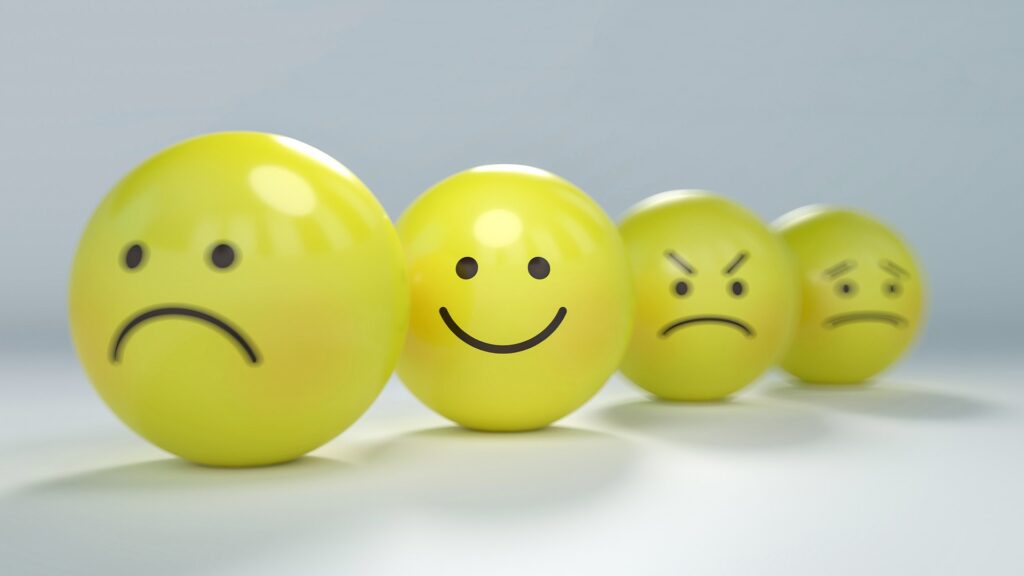One feature of anxiety is how our emotions can change so radically and so quickly; often with no apparent reason. This dramatic fluctuation in our mood just adds to the bewilderment that we feel about being in the anxiety state.

The first thing to do is to recognize that this is all normal. Everyone who suffers from anxiety has this experience to some degree. The fact we rarely know why our mood has changed is because a lot of what happens with anxiety does so on a subconscious level. Therefore “working it out” fails every time — because how can we solve something that we can’t see?
Our difficulty in accepting these mood changes has a lot to do with expectations. We want to and expect to be able to feel good from choice. But it doesn’t work that way. We cannot control how we feel, and the more we try to control our feelings (and fail), the more anxious we get.
As always, with aspects of anxiety, the only effective course of action is facing and accepting. This means letting go of any desire or expectation of feeling different than how we actually feel in this moment. Instead, we face our feelings, allowing them, and accepting this is how we feel right now.
That does not mean we will feel this way forever, or that by accepting feeling down or afraid, it will encourage more of those feelings. It just means accepting how we feel, even when we don’t like those feelings.
Cultural Conditioning
Many of us have been brought up to believe that we should be happy no matter what, and that if we are miserable, it is because we are failing, being a victim, or being ungrateful for what we have in life. This instilled way of looking at things as invalidated our legitimate feelings, portraying them as “wrong” or “undesirable”.
But sadness is just as valid a feeling as happiness. Anger, frustration, despair, anxiety, etc. all have their place. To resist them, suppress them, or try to change them is unhealthy.
Culturally we are told to “smile and forget about it”, “put on a happy face”, “why so glum?”, “cheer up”, “get over it” etc. People take “Don’t worry, be happy” as a workable prescription for a good life. But all these easy phrases ask us to deny our true feelings if they are so-called “negative emotions such as sadness, anxiety, anger, frustration, etc. And in denying them, we simply bottle them up, causing tension and internal conflict.
My Experience with Up and Down Emotions
I experienced these random and sometimes dramatic mood swings. What really helped me was to set aside any expectations for how I should feel, and any wishes to feel any differently than whatever my mood was. I didn’t like feeling anxious or sad or angry or frustrated etc., but accepted that these were natural emotions, even when I didn’t know why I felt that way.
I initially fought my feelings, and thought I should be able to feel better. It took time to recognize that those expectations didn’t help me feel the way I wanted to feel. I fact, my feelings seemed to decide themselves, regardless of what I wanted or expected, so it was really pointless to hope or expect that they be different.
In fact, if I allowed myself to have hope or expectations for how I felt and it didn’t come true, then the expectations just made me more miserable. Without expectations, it was easier to accept. I could also be happier with however my mood was, because I wasn’t comparing that with however I thought I should feel.
Feelings are always to be honored and trusted. Thoughts are often misleading and untrue.
Changing Our Reaction
A lot of our expectations are simply “habit” based on cultural beliefs and years of conditioning. It can take a bit of courage to let go and “free-wheel” because we feel that by surrendering to our emotions and giving up control, we are allowing bad things to happen. This is based on the erroneous belief that if we were always in perfect control, only good things would ever happen to us.
The problem is we are never in control anyway, no matter how hard we try to be. And our efforts to be in control simply exhaust us, keep our internal conflict going, and cause our suffering. It is our fighting to maintain control that got us into the anxiety state to begin with. It does not work, and in fact has the opposite effect.
The way forward is to honor and accept however we feel at all times. By changing the way we react to unpleasant emotions, we allow our minds and bodies to desensitize and heal. This allows our emotions to settle down and become less volatile.
For more information on how to handle the fluctuating emotions in the anxiety state, check out the following blog article:







